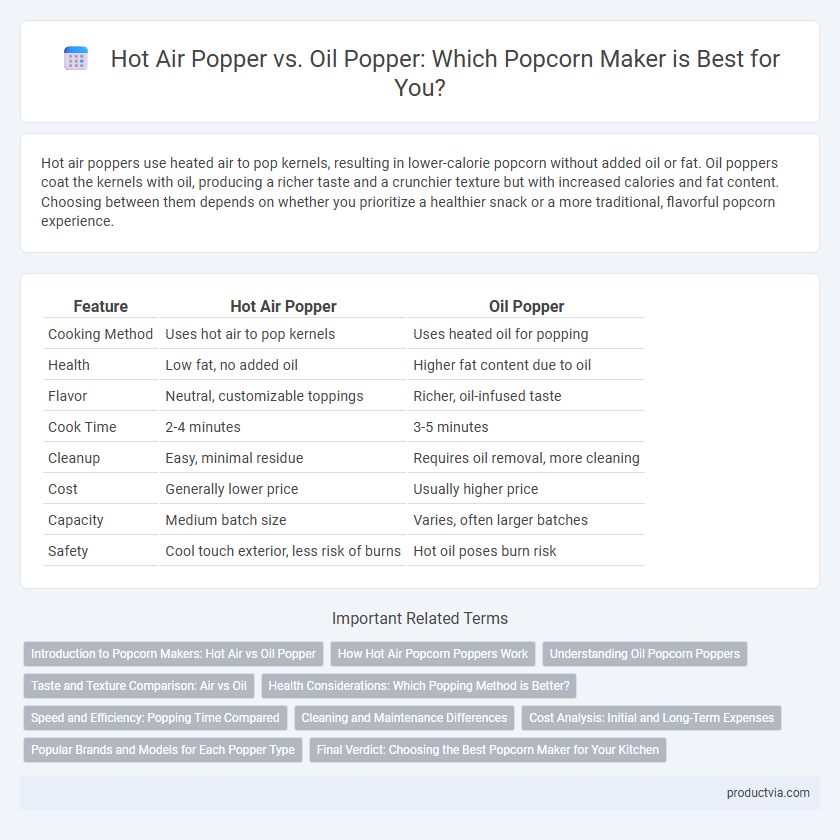Hot air poppers use heated air to pop kernels, resulting in lower-calorie popcorn without added oil or fat. Oil poppers coat the kernels with oil, producing a richer taste and a crunchier texture but with increased calories and fat content. Choosing between them depends on whether you prioritize a healthier snack or a more traditional, flavorful popcorn experience.
Table of Comparison
| Feature | Hot Air Popper | Oil Popper |
|---|---|---|
| Cooking Method | Uses hot air to pop kernels | Uses heated oil for popping |
| Health | Low fat, no added oil | Higher fat content due to oil |
| Flavor | Neutral, customizable toppings | Richer, oil-infused taste |
| Cook Time | 2-4 minutes | 3-5 minutes |
| Cleanup | Easy, minimal residue | Requires oil removal, more cleaning |
| Cost | Generally lower price | Usually higher price |
| Capacity | Medium batch size | Varies, often larger batches |
| Safety | Cool touch exterior, less risk of burns | Hot oil poses burn risk |
Introduction to Popcorn Makers: Hot Air vs Oil Popper
Hot air poppers use rapid hot air circulation to pop kernels without oil, producing a healthier, low-calorie snack while maintaining a light, natural popcorn flavor. Oil poppers rely on heating oil to cook kernels, resulting in richer taste and a slightly crispier texture, though with added calories and fat content. Choosing between hot air and oil poppers depends on dietary preferences and flavor desired, with hot air models favored for health-conscious users and oil poppers preferred for traditional taste.
How Hot Air Popcorn Poppers Work
Hot air popcorn poppers use rapid circulation of heated air to evenly pop kernels without the need for oil, producing a healthier snack option. The hot air flows through a chamber where kernels are rapidly heated until they burst, ensuring consistent popping and minimal burning. This method relies on the controlled temperature and airflow to separate the popcorn from unpopped kernels, delivering fluffy, low-calorie popcorn.
Understanding Oil Popcorn Poppers
Oil popcorn poppers use hot oil to evenly heat kernels, resulting in a richer taste and crispier texture compared to hot air poppers. These machines often allow for added flavor customization by incorporating various oils and seasonings during popping. While oil poppers require more cleanup and can produce slightly less healthy popcorn than hot air models, they deliver a classic, traditional popcorn experience favored by many snack enthusiasts.
Taste and Texture Comparison: Air vs Oil
Hot air poppers produce popcorn with a lighter, crispier texture and a clean, natural taste since no oil is used, making it a healthier option. Oil poppers create popcorn with a richer flavor and a slightly chewier texture due to the added fat, which helps seasonings adhere better. Taste preferences depend on whether you prioritize the pure corn flavor and crunchiness of air-popped popcorn or the fuller, more indulgent mouthfeel of oil-popped kernels.
Health Considerations: Which Popping Method is Better?
Hot air poppers produce popcorn without added oil, significantly reducing calorie and fat intake, making them ideal for health-conscious individuals. Oil poppers, while enhancing flavor and texture, introduce additional fats that may contribute to higher cholesterol levels if consumed frequently. Choosing a hot air popper promotes a lower-fat, heart-healthy snack option with fewer calories and no risk of unhealthy oil residues.
Speed and Efficiency: Popping Time Compared
Hot air poppers typically complete the popping process within 2 to 4 minutes by using rapid hot air circulation, resulting in faster preparation compared to oil poppers, which generally take 4 to 6 minutes due to heating oil and kernels simultaneously. Efficiency in hot air poppers is higher since they consume less energy and produce fewer calories by eliminating the need for oil. Oil poppers might yield richer flavor but trade-off speed and energy efficiency for taste and texture enhancements.
Cleaning and Maintenance Differences
Hot air poppers require minimal cleaning since they don't involve oil, reducing residue buildup and making maintenance quicker and easier. Oil poppers accumulate greasy residues that necessitate thorough cleaning of both the heating element and removable oil trays to prevent rancidity and ensure optimal performance. Regular maintenance of oil poppers includes washing detachable parts and wiping down oil splatters, whereas hot air poppers mainly need occasional dusting and air vent clearance.
Cost Analysis: Initial and Long-Term Expenses
Hot air poppers typically have a lower initial cost, ranging from $20 to $50, while oil poppers usually cost between $30 and $70 due to their heating elements. Long-term expenses favor hot air poppers by eliminating the need for oil purchases, resulting in savings on popcorn preparation costs. Conversely, oil poppers incur ongoing costs for cooking oils, which increase the total expenditure over time despite often producing a different flavor profile.
Popular Brands and Models for Each Popper Type
Popular hot air poppers include the Presto PopLite and Cuisinart EasyPop, known for their fast, oil-free popping and easy cleanup, ideal for health-conscious consumers. Oil poppers like the West Bend Stir Crazy and Hamilton Beach Electric Popcorn Popper offer rich flavor and traditional taste by allowing the use of oil and seasonings, with models favored for their stirring mechanisms and capacity. Both types cater to different preferences, with hot air poppers excelling in convenience and oil poppers preferred for enhanced flavor profiles.
Final Verdict: Choosing the Best Popcorn Maker for Your Kitchen
Hot air poppers produce healthier popcorn by using no oil, resulting in lower calorie counts and a cleaner taste, while oil poppers offer richer flavor and a crunchier texture due to the added fat. Consider your dietary preferences and desired taste when selecting between the two; hot air poppers excel in health-conscious kitchens, whereas oil poppers appeal to those seeking traditional buttery popcorn. The best popcorn maker depends on your balance of health goals and flavor preferences, making hot air poppers ideal for low-fat snacking and oil poppers perfect for indulgent movie nights.
Hot Air Popper vs Oil Popper for Popcorn Infographic

 productvia.com
productvia.com